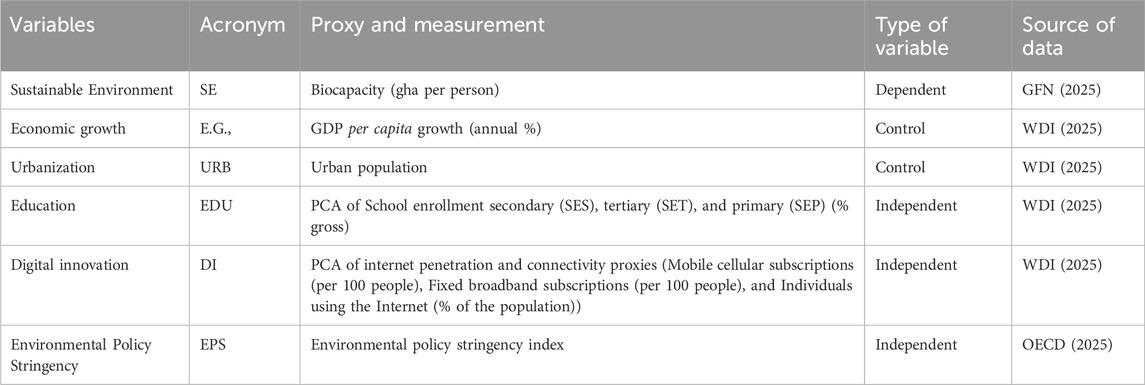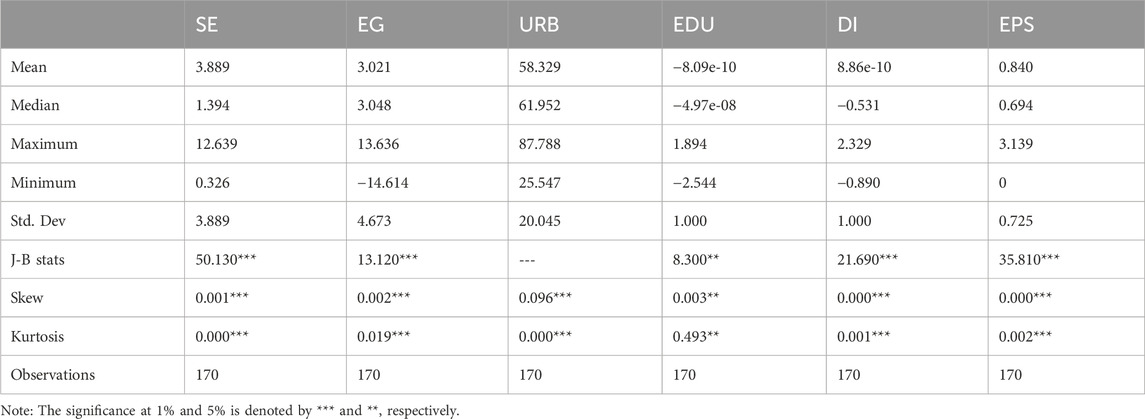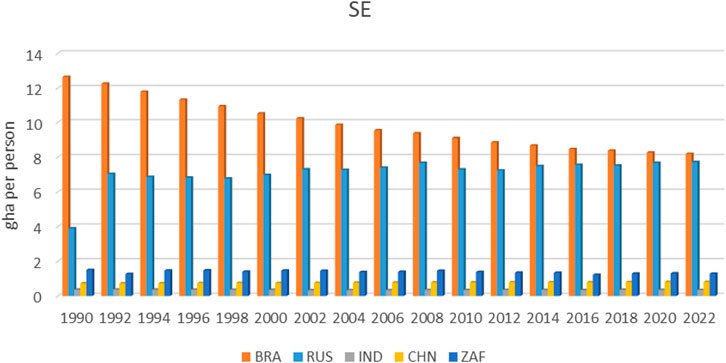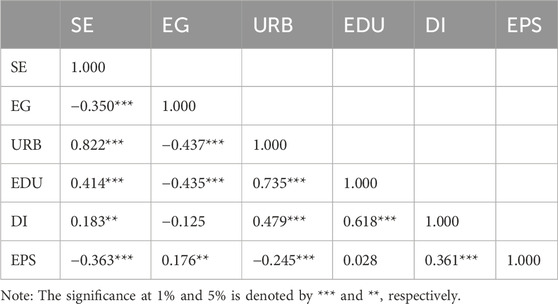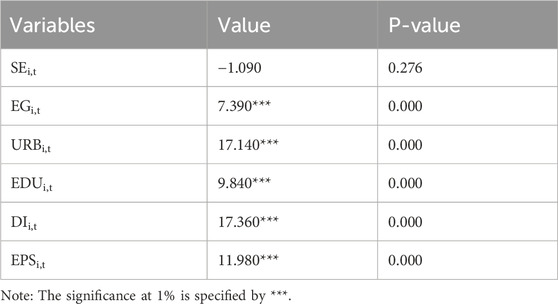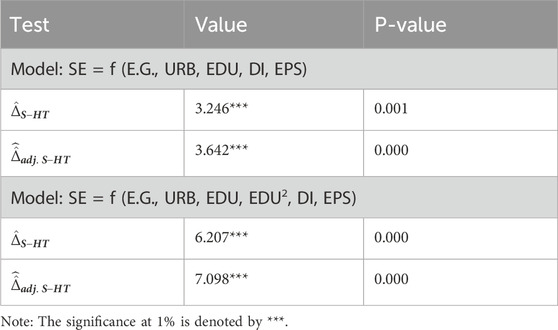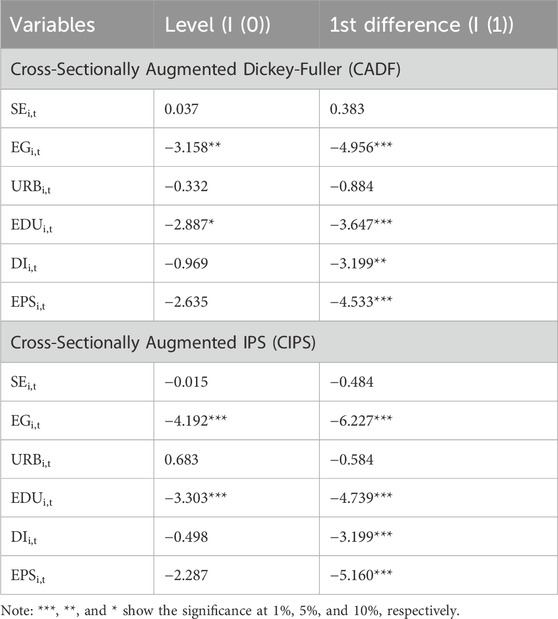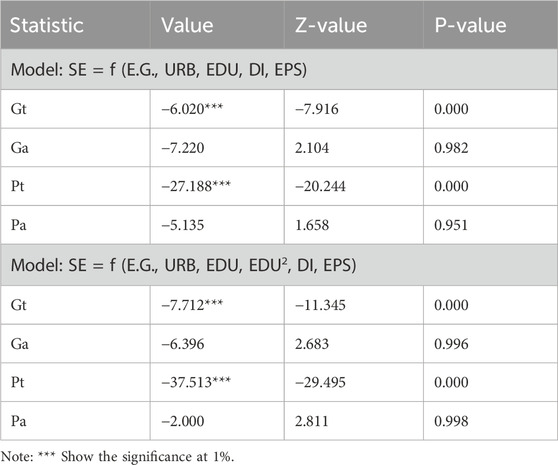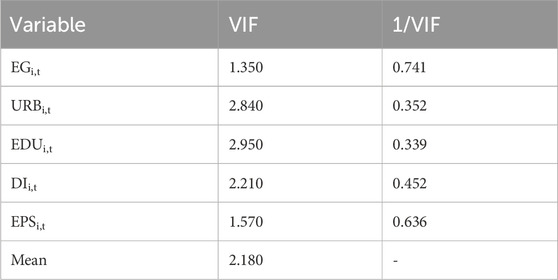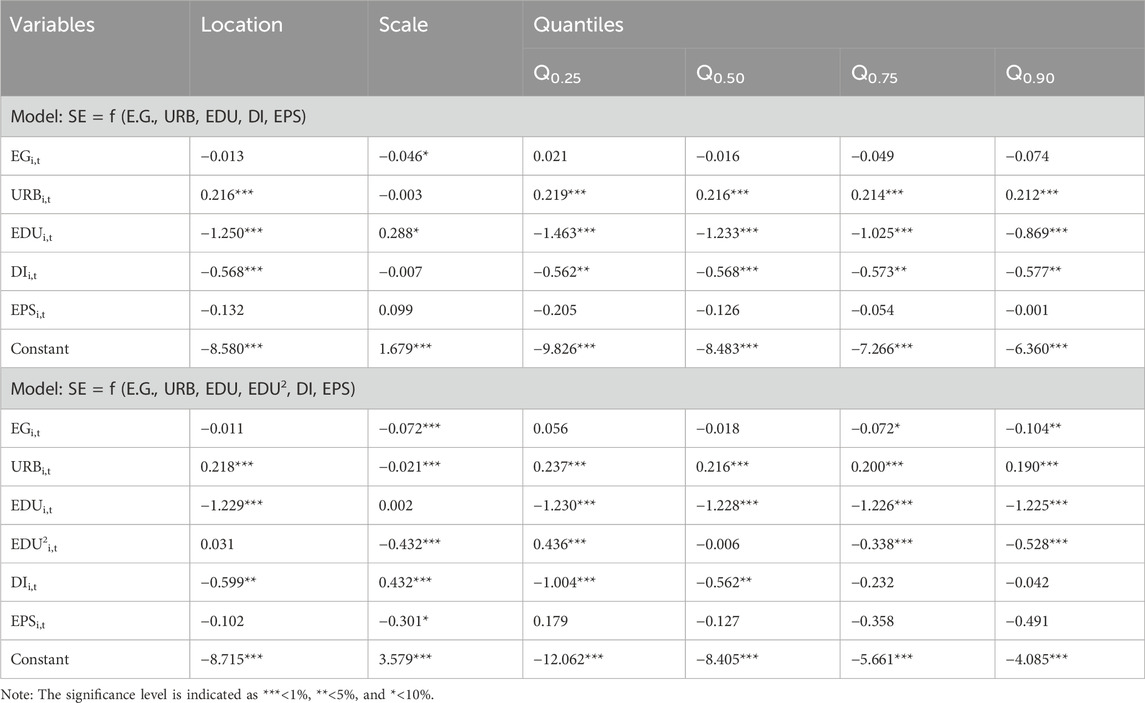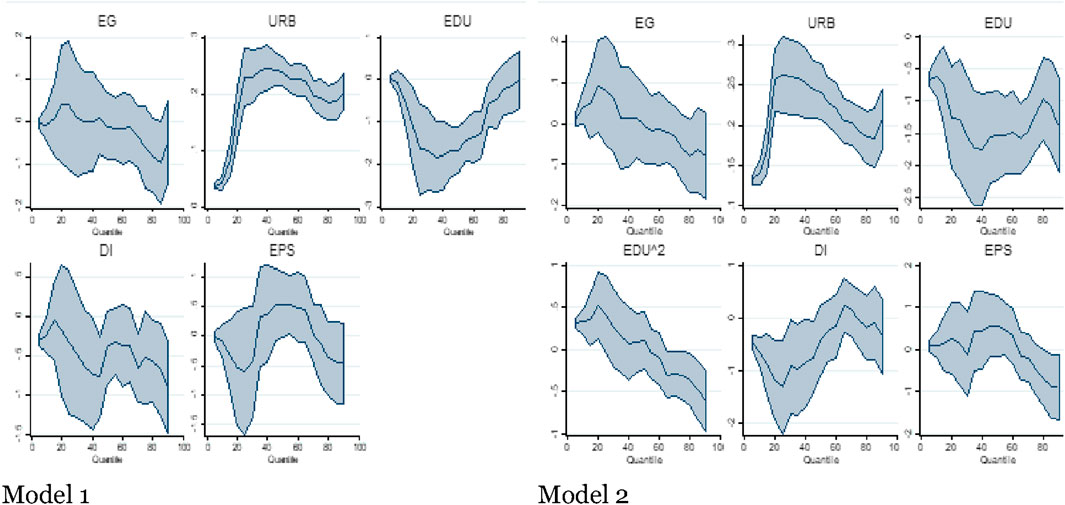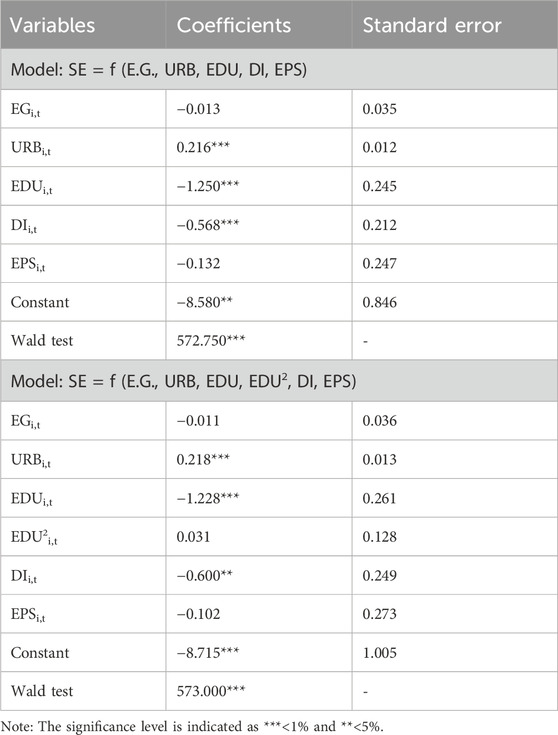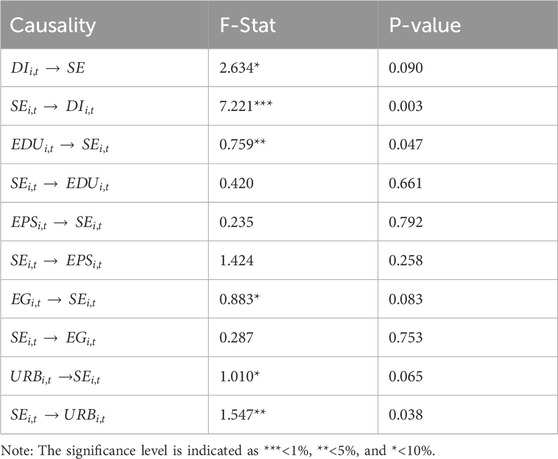- 1 School of Marxism, Shanxi Vocational University of Engineering Science and Technology, China
- 2 School of Law, Tianjin University of Commerce, Tianjin, China
As emerging global economic powers, BRICS nations face a critical challenge in balancing rapid development with environmental sustainability. While industrial expansion, digital transformation, and urbanization have accelerated economic growth, these trends have also intensified ecological pressures, necessitating comprehensive policy solutions. Recognizing this urgency, the present study examines the determinants of environmental sustainability in BRICS nations from 1990 to 2023, focusing on economic growth (E.G.,), urbanization (URB), education (EDU), digital innovation (DI), and environmental policy stringency (EPS). By addressing the complex interactions among these variables, the study aims to provide empirical insights into how socioeconomic and technological advancements shape environmental outcomes. To achieve this, the study employs the Method of Moments Quantile Regression (MMQR) to capture heterogeneous effects across different sustainability levels, Feasible Generalized Least Squares (FGLS) for robustness validation, and Granger causality analysis to establish directional relationships. The findings reveal a nonlinear role of education, where in the linear model, EDU exacerbates environmental degradation due to its early association with industrial expansion. However, in the nonlinear model incorporating EDU2, education exhibits an inverted U-shaped effect, initially straining the environment but later fostering sustainability as higher attainment levels promote ecological awareness and technological innovation. Urbanization consistently enhances sustainability across models, while digital innovation imposes environmental burdens, highlighting the need for green technological policies. Economic growth presents mixed effects, suggesting that regulatory interventions are required to steer economic expansion toward sustainable pathways. The study’s novelty lies in its empirical approach, uncovering threshold effects of education and asymmetries in digital innovation’s environmental impact, providing deeper insights into sustainability dynamics within emerging economies. The policy implications are profound—governments must integrate sustainability into education reforms, urban development strategies, and digital regulatory frameworks to ensure long-term ecological resilience. By aligning sustainability policies with SDG commitments and COP climate agreements, BRICS nations can effectively transition toward a green economic model, balancing development with environmental stewardship.
1 Introduction
Environmental sustainability has emerged as a critical challenge for BRICS nations—Brazil, Russia, India, China, and South Africa—as they experience rapid economic growth, urbanization, and digital transformation (Farooq et al., 2023; Zhao et al., 2024). These developmental shifts, while driving industrial progress, have also intensified environmental pressures, particularly in the form of rising carbon emissions and ecological degradation (Caglar et al., 2023; Esmaeil et al., 2020; Kongbuamai et al., 2020; Tariq et al., 2024). Countries like China and India face increasing health and environmental risks linked to air pollution and fossil fuel dependency, highlighting the urgency of aligning economic development with sustainability goals (Dincă et al., 2022; Eyuboglu et al., 2024; Ma et al., 2025; Sajith Kumar et al., 2022).
Ecological sustainability, as used in this study, refers to the capacity of natural systems to maintain their essential functions, diversity, and productivity over time while supporting human development needs (Caglar et al., 2024). To operationalize this concept, we utilize biocapacity as a proxy indicator of environmental sustainability. Biocapacity measures the biological productivity of ecosystems—specifically their ability to regenerate resources and absorb waste, including carbon emissions. It comprises several land-use components: cropland, grazing land, forest land, fishing grounds, and built-up land. These components collectively reflect the ecological pressure exerted by human activities and the regenerative capacity of the environment. Environmental sustainability demands a balance between resource consumption and regeneration, and its attainment requires not just technological innovation but also institutional commitment and societal behavioral change (Buhari et al., 2020; Gao and Fan, 2023). Closely linked is the concept of resilience, which denotes the ability of ecosystems and social systems to absorb disturbances, adapt, and reorganize without compromising long-term functionality or the continued provision of ecosystem services (Gayen et al., 2024; Luo et al., 2024). In the context of BRICS, resilience encompasses the adaptability of environmental policies, urban systems, and human capital to shifting socio-economic and ecological conditions.
The global urgency of these challenges is articulated in the United Nations Sustainable Development Goals (UNSDGs)—a blueprint for achieving a better and more sustainable future by 2030. Several goals are directly pertinent to this study: SDG 4 (Quality Education), SDG 9 (Industry, Innovation, and Infrastructure), SDG 11 (Sustainable Cities and Communities), and SDG 13 (Climate Action). These goals underscore the need to integrate environmental objectives into education, technology, governance, and economic development (Akrofi et al., 2022). Moreover, SDGs 14 (Life Below Water) and 15 (Life on Land) are foundational to the entire SDG framework, acting as multipliers of co-benefits across the goals. Conservation of biodiversity under these goals supports the achievement of other SDGs by enhancing ecosystem services, promoting resilience, and sustaining livelihoods. This interdependence highlights the necessity of incorporating biodiversity considerations into strategies aimed at achieving the broader SDG agenda (Obrecht et al., 2021).
In this context, education (EDU), digital innovation (DI), and urbanization (URB) represent three pivotal forces shaping environmental outcomes in emerging economies. EDU is frequently cited as a driver of sustainable behavior and policy innovation (Li et al., 2023). However, its influence is not monolithic. For this study, we adopt the standard classification where primary and secondary education represent lower educational levels, while tertiary education (such as university or vocational degrees) constitutes higher education. Tertiary education is often linked to ecological responsibility and technological advancement, while lower education levels have been historically associated with industrial expansion and increased environmental strain (Haseeb et al., 2023; Kalaycı Alas and Korutürk, 2024; Li et al., 2025), suggesting a nonlinear relationship between educational attainment and environmental outcomes.
Building on this, digital innovation (DI) also plays a complex role. Emerging technologies such as AI and IoT can facilitate sustainability goals through smarter systems and efficiencies but may simultaneously lead to greater emissions and electronic waste if deployed without robust regulatory oversight (Adebayo et al., 2022; Dilanchiev and Taktakishvili, 2021; Hu et al., 2024; Lisha et al., 2023; Ramzan, 2021). Thus, understanding the governance of digital transformation becomes critical, especially in contexts where institutional capacity may be uneven (Li and Jianxing, 2024; Sinha et al., 2020a; 2020b; Waris et al., 2023).
Urbanization (URB), the third focal parameter, continues to reshape socio-environmental systems. While structured urban development can promote sustainability through efficient infrastructure and land use, unregulated expansion frequently contributes to habitat loss and pollution (Mehmood et al., 2023; Yang et al., 2024). The interplay between URB and environmental policy stringency (EPS) is also crucial, as the real-world impact of such policies depends heavily on their design and enforcement, which vary across national contexts (OECD, 2022).
Given these complexities, this study investigates how EDU, DI, URB, EPS, and economic growth (E.G.,) influence the sustainable environment (SE) in BRICS nations from 1990 to 2023. In doing so, it seeks to fill critical gaps in the literature by:
• Examining the nonlinear effects of education on sustainability,
• Evaluating the environmental consequences of digital innovation, and
• Assessing how urbanization and policy stringency interact with sustainability outcomes in different national contexts.
A key methodological contribution of this study lies in its use of a multi-analytical approach to explore the environmental impacts of education, digital innovation, and urbanization across BRICS nations. Specifically, we employ Method of Moments Quantile Regression (MMQR) to capture variations in these relationships across different levels of sustainability performance—an advancement over conventional mean-based models that often overlook such distributional nuances. Additionally, Feasible Generalized Least Squares (FGLS) is applied to enhance robustness against heteroscedasticity, and Granger causality analysis is used to examine potential directional influences among variables. Together, these methods provide a more differentiated and context-sensitive understanding of sustainability dynamics in emerging economies.
By integrating education, technology, urbanization, and policy into a unified analytical framework, this research advances a comprehensive model of sustainability planning tailored to emerging economies. Its alignment with SDG commitments and COP climate agreements ensures relevance for both national policymakers and international development agendas.
This study formulates the following hypotheses to guide empirical investigation:
H1. Higher levels of educational attainment—particularly tertiary education—will have a positive and significant effect on environmental sustainability across BRICS nations, reflecting the role of education in promoting environmental awareness and policy engagement.
H2. Increased digital innovation is expected to exert a positive influence on sustainability outcomes by enhancing efficiency and supporting green technologies, although its benefits may be offset if not managed with appropriate environmental safeguards.
H3. Urbanization, when accompanied by structured infrastructure and planning, will have a positive and significant impact on environmental sustainability through resource optimization and reduced per capita emissions.
H4. Both economic growth and environmental policy stringency are hypothesized to have a positive and significant association with sustainability performance, indicating the importance of institutional and economic drivers in shaping environmental outcomes.
These hypotheses are framed to reflect testable, directional expectations based on existing literature and are intended to inform empirical analysis and policy discussions on sustainability in emerging economies.
The subsequent sections are detailed as follows. Section 2 highlights the importance of leveraging digital innovation and education in urban settings to foster environmentally sustainable communities. Section 3 elaborates on the empirical methods used to examine the relationships between environmental policies, urbanization, education, urban population, and environmental health. Section 4 presents the key findings and discussions. Finally, the concluding section offers policy recommendations and final reflections.
2 Literature review
This section presents a review of the literature exploring the connections between education, ecological policies, urbanization, digital innovations, and environmental sustainability.
2.1 Education-environment link
Accurately assessing how environmental awareness influences non-renewable energy use in developing countries remains challenging due to data limitations (Li M. et al., 2021). While education plays a crucial role in promoting sustainable practices, its direct impact on environmental quality remains debated (Wu et al., 2023). Research examining China’s low-carbon economy suggests that environmental education enhances public awareness, yet its effect on emissions reduction is conditional on policy enforcement and economic incentives.
Educational attainment has been linked to household energy efficiency and industrial pollution reduction, although these effects vary across sectors and regions Zhang G. et al. (2025) and Zhang et al.'s, (2025b) study focuses on air pollution and green innovation in industrial enterprises, finding that education fosters technological innovation rather than directly reducing household energy use. Similarly, Boujedra and Jebli, (2025) argue that digital transformation, driven by human capital development, improves environmental sustainability, but caution that education alone is insufficient for driving comprehensive emissions reductions.
Cordero et al. (2020) investigate the lifetime impact of education on individual carbon footprints rather than specific pollutants like CO2, SO2, and NO2. Their findings suggest that education influences consumption patterns and long-term environmental behavior, but structural barriers limit its effectiveness in large-scale emissions mitigation. Sahu et al. (2024) examine higher education institutions’ role in campus sustainability efforts, highlighting how universities integrate sustainability into research and operations rather than directly affecting national energy conservation trends.
Osuntuyi and Lean, (2023) explore the moderating effect of education on economic growth, energy use, and environmental degradation in African economies. Their results indicate that higher educational attainment supports energy efficiency and sustainable development, reinforcing the necessity of educational reforms in climate policy.
However, linking education directly to pro-environmental behavior (PEB) is complex. Gkargkavouzi et al. (2018) emphasize that educational attainment alone does not consistently predict environmentally responsible actions, as PEB is shaped by environmental identity, cultural norms, and socio-economic context. For instance, individuals with strong environmental identities often engage in sustainable behavior irrespective of their formal education level (Křepelková et al., 2020). Income also mediates access to sustainable lifestyle choices, such as electric vehicle adoption and energy-efficient appliances, suggesting that PEB is highly dependent on structural conditions rather than solely on education (Larson et al., 2015).
PEB spans multiple domains—public, private, and civic engagement—requiring nuanced measurement approaches (Larson et al., 2015; Markle, 2013). Recent studies advocate for multi-dimensional assessments of environmental behavior, incorporating factors such as intent, locality, and collective action (Markowitz et al., 2012). While environmental education may encourage recycling and energy conservation, higher-impact actions like home retrofitting or EV adoption remain contingent on economic affordability.
This understanding underscores that while education plays a vital role in fostering environmental consciousness, its influence is mediated by identity alignment, financial access, and behavioral context. Effective sustainability policies must incorporate these social and economic intersections to maximize education’s environmental impact.
2.2 The ecological policies–environmental sustainability nexus
Environmental degradation is widely recognized as a negative externality, where market mechanisms fail to regulate pollution effectively. This necessitates government intervention through stringent environmental policies to mitigate ecological harm (Chen et al., 2020). Environmental economics provides a theoretical foundation for understanding how policy instruments—such as carbon pricing, subsidies for green technology, and regulatory frameworks—can correct market failures and promote sustainability (Baloch and Wang, 2019).
Governments employ various policy tools to enhance environmental sustainability (Li X. et al., 2021; Li et al., 2022; Li M. et al., 2021). Command-and-control regulations, such as emission limits and pollution permits, have been instrumental in reducing industrial emissions (Zhang G. et al., 2025). Additionally, market-based instruments, including carbon taxes and tradable emission allowances, incentivize firms to adopt cleaner technologies. Empirical studies highlight the effectiveness of these policies in reducing ecological footprints across G20 nations (Zhao et al., 2025).
Recent research underscores the role of institutional quality and technological innovation in shaping environmental policy outcomes (Dong and Yu, 2024). Strong governance structures and investment in green innovation significantly enhance policy effectiveness, ensuring long-term sustainability (Jie et al., 2024). Khan (2024) examines provincial environmental laws in Pakistan, demonstrating how constitutional amendments have empowered federal and provincial governments to enact targeted environmental protection measures.
Moreover, government-initiated environmental programs addressing CO2 emissions and renewable energy adoption have proven effective in mitigating climate change impacts (Ouyang et al., 2020). Studies on low-carbon city transformations reveal that integrated policy approaches—combining regulatory, economic, and technological strategies—yield substantial environmental benefits (Cai et al., 2024; Xu et al., 2023).
2.3 The urbanization–environmental health connection
The relationship between urbanization and environmental health has been widely studied, with researchers emphasizing both its challenges and potential solutions. Jiang et al. (2025) examined the Urban Vulnerability-Adaptation-Settlements (VAS) nexus, demonstrating that rapid urbanization exacerbates environmental stressors, including air pollution and resource depletion. Their study highlights the importance of smart governance and green infrastructure in mitigating these adverse effects. Similarly, James (2024) assessed the environmental consequences of urbanization, identifying key concerns such as habitat loss, excessive resource consumption, and increased greenhouse gas emissions. His findings suggest that equitable development policies and conservation efforts are essential in counteracting urbanization-induced environmental degradation.
Expanding on these perspectives, Qian (2024) conducted an empirical analysis of urban expansion in China, India, and Indonesia, revealing that urbanization significantly accelerates carbon emissions. However, the study also found that institutional quality and renewable energy adoption can moderate these effects, suggesting that policy interventions play a crucial role in shaping sustainable urban growth. These findings align with broader research on urbanization and environmental health, such as Sun et al. (2023), who identified an inverted U-shaped relationship between urbanization and environmental pollution, indicating that while urbanization initially worsens environmental conditions, advanced urban planning and technological innovations can eventually lead to improvements. Additionally, Salgado et al. (2020) conducted a systematic review of environmental determinants in urban settings, concluding that socioeconomic factors, air quality, and access to green spaces significantly influence public health outcomes.
Despite these shared concerns, methodological approaches vary across studies. Jiang et al. (2025) employed a conceptual framework focusing on governance and infrastructure, while James (2024) utilized a policy analysis approach to assess urbanization’s environmental consequences. Qian (2024), in contrast, applied econometric modeling to quantify the impact of urban expansion on carbon emissions. Sun et al. (2023) adopted a system GMM method to analyze urbanization’s dual effects on environmental pollution and public health, whereas Salgado et al. (2020) conducted a systematic literature review to synthesize findings across multiple urban health studies. These methodological differences highlight the complexity of the urbanization–environmental health nexus, demonstrating that while urbanization presents significant sustainability challenges, targeted policy interventions and technological advancements can mitigate its negative effects.
2.4 Digital innovation-environmental health relationship
The relationship between digital innovation and environmental equitability follows a dynamic trajectory, initially contributing to increased emissions before facilitating sustainability improvements (Luo et al., 2023). Studies examining this link often reference the Environmental Kuznets Curve (EKC) framework, which suggests that technological advancements may first exacerbate environmental degradation before leading to long-term ecological benefits.
Malmodin and Lundén, (2018) highlight that early-stage technological advancements, particularly in the ICT sector, tend to increase carbon emissions due to heightened energy consumption and infrastructure expansion. Similarly, Gillingham et al. (2016) emphasize the rebound effect, wherein efficiency gains in digital technologies can lead to increased overall energy use, offsetting initial sustainability benefits. These findings align with Avom et al. (2020), who report that ICT adoption in Sub-Saharan Africa has contributed to higher CO2 emissions, reinforcing the notion that digital transformation can initially strain environmental resources.
An increasingly relevant concern is the rapidly growing energy demand associated with artificial intelligence (AI) systems. As AI models and data centers expand in scale, so too does the need for energy-intensive computing and cooling infrastructure (Yu et al., 2024). Recent estimates suggest that AI training and deployment could consume as much energy as small nations, particularly if reliant on fossil fuels (Berthelot et al., 2024). The environmental and human health consequences of this trend are closely tied to the type of energy used—renewable sources may mitigate carbon footprints, while nonrenewable energy exacerbates both emissions and localized air quality degradation (Ragazzi et al., 2017).
However, as digital innovation matures, its role in promoting sustainability becomes more evident. Danish (2019) finds that while technology use initially diminishes sustainability in low-income countries, it enhances environmental outcomes in high- and middle-income nations over time. Faisal et al. (2020) further support this trend, demonstrating that technological adoption initially increases carbon emissions in China, Brazil, India, and South Africa but leads to reductions in the long term as efficiency improvements and regulatory frameworks take effect. Godil et al. (2020) confirm this pattern in Pakistan, where digital innovation has contributed to lower environmental pollution through enhanced energy efficiency and smart infrastructure.
This evolving impact of digital innovation cannot be viewed in isolation. Its environmental outcomes are shaped by interconnected factors such as education, which informs responsible tech use, and urbanization, which amplifies energy demand (Singh et al., 2025). Weaving these interdependencies—between human capital, infrastructure growth, and institutional regulation—is essential to understand how digital innovation can either exacerbate or alleviate sustainability challenges (Zeng and Punjwani, 2025).
3 Empirical data and methodology
3.1 Data statistics
The study employs panel data spanning from 1990 to 2023, selected based on the availability and consistency of data across key indicators. The dataset focuses on five BRICS nations—Brazil, Russia, India, China, and South Africa—due to the availability of reliable data on environmental policy stringency; other BRICS-Plus nations were excluded due to data limitations in this variable. Table 1 presents an overview of the variables, their acronyms, proxy measures, classifications, and sources. The dependent variable, Sustainable Environment (SE), is proxied by Biocapacity (global hectares per capita) sourced from the Global Footprint Network (GFN, 2025). Control variables include Economic Growth (E.G.,), measured by GDP per capita growth, and Urbanization (URB) via urban population figures—both obtained from the World Development Indicators (WDI, 2025). The core independent variables are: Education (EDU), synthesized using Principal Component Analysis (PCA) from gross enrollment rates at primary, secondary, and tertiary levels; Digital Innovation (DI), also PCA-computed from mobile subscriptions, broadband subscriptions, and internet usage rates; and Environmental Policy Stringency (EPS), drawn from the OECD (2025). Any missing values were handled using established statistical imputation techniques to ensure robustness and minimize bias in the analysis.
The descriptive statistics presented in Table 2 offer a preliminary insight into the distribution and variability of the key variables analyzed in this study. The mean value of sustainable environment (SE) stands at 3.889, indicating moderate biocapacity levels across the BRICS nations, with a substantial range (0.326–12.639), reflecting environmental heterogeneity (see Figure 1). Economic growth (E.G.,) displays a notable spread (−14.614 to 13.636), capturing both contractionary and expansionary phases, which is typical for emerging economies. Urbanization (URB) has a relatively high average of 58.33%, suggesting ongoing urban transition, with standard deviation reflecting diverse development stages across countries.
The PCA-transformed variables—education (EDU) and digital innovation (DI)—have standardized means near zero and unit standard deviations, consistent with the dimensionality reduction method used. Environmental policy stringency (EPS) shows a mean of 0.840 but a wide dispersion (0–3.139), highlighting differing regulatory intensities among the countries. The Jarque-Bera (J-B) statistics, along with significant skewness and kurtosis values (mostly at 1% significance), confirm the non-normal distribution of most variables, justifying the use of robust estimation techniques like MMQR and FGLS in the analysis.
The correlation matrix in Table 3 reveals several statistically significant associations among the study variables. Notably, SE is strongly and positively correlated with URB (0.822) and moderately with EDU (0.414), suggesting that higher urbanization and educational levels are associated with improved environmental sustainability across BRICS nations. However, SE shows a significant negative correlation with, E.G., (−0.350) and EPS (−0.363), implying that rapid economic growth and stringent policies might initially strain environmental capacity, possibly due to industrial expansion or short-term compliance costs (Shao et al., 2019; Ullah et al., 2023). The positive but weaker correlation between SE and DI (0.183) suggests a modest role of digital innovation in enhancing environmental outcomes. Additionally, EDU is highly correlated with URB (0.735) and DI (0.618), reflecting interconnected development dynamics where education supports urban digital transformation. Interestingly, EPS is positively linked to DI (0.361) but negatively to URB (−0.245) and, E.G., (0.176), indicating that countries with more stringent policies tend to emphasize digital tools while potentially restraining uncontrolled urban and economic expansion. Overall, while multicollinearity does not appear severe, the significant correlations highlight intricate interdependencies that justify the study’s multivariate approach.
3.2 Estimation methodology
The empirical investigation is grounded in two primary models aimed at examining the determinants of environmental sustainability (SE) across BRICS nations. Model (1) specifies a direct linear relationship where SE is a function of economic growth (E.G.,), urbanization (URB), education (EDU), digital innovation (DI), and environmental policy stringency (EPS). This specification is rooted in the Environmental Kuznets Curve (EKC) hypothesis, which posits a nonlinear association between, E.G., and SE, suggesting that after a certain level of income, economic progress leads to environmental improvements (Grossman and Krueger, 1995). Additionally, Human Capital Theory (Becker, 2009) underpins the role of education, asserting that greater investment in education fosters environmentally responsible behavior and supports green innovation.
Model (2) introduces a nonlinear specification for education, by incorporating the square of the education variable (EDU2) to capture potential diminishing or threshold effects. This transformation allows the model to test for a U-shaped or inverted U-shaped relationship between education and sustainability. This is particularly insightful as it explores whether the effect of education on biocapacity may be initially limited or even negative (due to urban-industrial expansion with basic education), but eventually becomes positive as higher educational attainment promotes environmental awareness and innovation. This dynamic reflects the Threshold Hypothesis in education-environment literature and aligns with the Diffusion of Innovations Theory (Rogers, 2003), which highlights how knowledge diffusion through education accelerates the adoption of environmentally sustainable practices and technologies.
The following empirical models of the study are presented in Equations 1–4:
The log-linear transformation of the above models appears below:
In above equations
Before establishing the integration order of each element, we must commence our econometric analysis by assessing the degree of cross-sectional dependency (CD) of the highlighted variables. Consequently, the CD test developed by Pesaran (2007) can be employed to estimate the cross-sectional dependence on residuals.
The equation for the CD assessment is shown below in Equations 5–9:
Using the slope homogeneity analysis, the consistency of the slope coefficients in the cointegration equation was determined. Formerly invented by Swamy (1970), Hashem Pesaran and Yamagata (2008) developed and employed the test to generate two statistics. The test was created by, but subsequently utilized to get two statistics:
Pesaran’s (2007) second-generation panel unit root is the next test, the enhanced cross-sectional IPS (CIPS) evaluation, which is based on the traditional Cross-sectional Augmented Dickey-Fuller (CADF) statistic regression. Westerlund’s (2007) cointegration methodologies might then be used to confirm long-term cointegration.
Here, is Pesaran’s CADF test:
Equation 9, on the other hand, parades the cross-sectional Parallel to Im, Pesaran, and Shin (Im et al., 2003) scrutiny as follows:
where N is the number of elucidations.
Westerlund’s (2007) cointegration procedure is as follows in Equations 10–12:
The evaluation of Equation 10 will have rendered the subsequent four distinct tests obsolete:
Mean Group Tests:
Panel-based tests:
We model the influence of independent factors on the distribution of SE using the panel MMQR approach developed by Machado et al. (2019) in Equations 13–16.
The unidentified factors are indicated by
The formula
This model’s goal is to resolve optimization issues brought on by the observed quantile in Equation 17:
The check function is exemplified by
As a robustness check following the MMQR estimation, the present study employs the Feasible Generalized Least Squares (FGLS) technique to examine the stability and direction of the associations among education (EDU), economic growth (E.G.,), digital innovation (DI), urbanization (URB), and sustainable environment (SE). FGLS is widely recognized across disciplines for its ability to address issues of heteroskedasticity and autocorrelation, providing efficient and reliable parameter estimates when the error structure is non-spherical, thus reinforcing the credibility of the primary findings.
This study adopts the Granger causality test approach suggested by Dumitrescu and Hurlin (2012) to provide insight into the directional connections between economic variables. This strategy is exemplified as:
The factors
4 Results and discussions
The results of the cross-section dependence (CD) test in Table 4 reveal that most variables—EG, URB, EDU, DI, and EPS—exhibit significant cross-sectional dependence, indicating that developments in one BRICS country tend to influence others. This finding aligns with the expectation of strong regional interconnectedness, particularly in areas such as economic growth, technological advancement, and policy responses to global environmental challenges. However, in contrast, SE (proxied by biocapacity) does not exhibit significant cross-sectional dependence (p-value = 0.276), suggesting that biocapacity is shaped largely by country-specific conditions. This apparent isolation may stem from substantial heterogeneity in natural resource endowments, geographic and ecological systems, and the structure of land use and conservation policies across BRICS nations. Unlike policy- or technology-driven variables, biocapacity is deeply rooted in physical and biological characteristics that are not easily transferrable or influenced by external shocks. Moreover, national-level ecological strategies and varying commitments to biodiversity and land preservation may further reinforce this divergence. While this outcome may appear to challenge assumptions of regional environmental interdependence, it underscores the need to differentiate between shared policy challenges and localized ecological capacities. The CD results thus provide important justification for the use of robust estimation techniques like MMQR and FGLS, which can accommodate both interdependent and independent cross-sectional structures.
The slope heterogeneity test results in Table 5 reveal key differences between the two model specifications. For the linear (SE = f (E.G., URB, EDU, DI, EPS)) and nonlinear (SE = f (E.G., URB, EDU, EDU2, DI, EPS)) models, both the standard and adjusted test statistics are highly significant at the 1% level, confirming the presence of slope heterogeneity across countries. This suggests that the impact of explanatory variables on SE differs substantially among BRICS nations, reinforcing the need for estimation techniques like MMQR that account for such variation.
To achieve trustworthy and effective estimates, it is essential to eliminate time-dependent elements from the data to assess its stationarity before implementing any robustness or regression analyses (Hu et al., 2022). The unit root diagnostics in Table 6, conducted through CADF and CIPS tests, reveal a mixed integration order among the variables, with critical implications for model specification. E.G., and EDU are found to be stationary at the level under both tests, indicating I (0) behavior, while DI and EPS achieve stationarity only after first differencing, confirming they are I (1). However, SE and URB remain non-stationary even after first differencing in both CADF and CIPS tests, suggesting potential issues with their integration properties. This persistent non-stationarity could reflect structural shifts, measurement inconsistencies, or long-term trends not captured by standard differencing. Therefore, the application of robust estimation methods like MMQR and FGLS is particularly appropriate, as these techniques can accommodate non-stationary panels and provide consistent estimates in the presence of unit root and slope heterogeneity.
The results of Westerlund’s (2007) cointegration test in Table 7 provide mixed but insightful evidence regarding the long-run equilibrium relationships among the variables in both model specifications. For the linear model, the Gt and Pt statistics are highly significant at the 1% level, indicating strong evidence of cointegration based on group-mean and panel-based t-statistics. However, the Ga and Pa statistics are not significant, suggesting that when averaging across units, cointegration is not uniformly present—highlighting potential heterogeneity across BRICS nations.
In the nonlinear model, a similar pattern emerges. The Gt (−7.712) and Pt (−37.513) statistics remain highly significant, reinforcing the presence of cointegration based on t-statistics, even when education is modeled nonlinearly. Yet again, the Ga and Pa statistics are not significant, suggesting that cointegration is not consistent across all cross-sectional units when using average-based approaches.
Overall, these results confirm that long-run relationships exist among the variables in both models, particularly when considering individual panel dynamics (Gt and Pt), but also highlight the importance of accounting for cross-sectional heterogeneity, justifying the use of distribution-sensitive techniques such as MMQR.
The Variance Inflation Factor (VIF) results presented in Table 8 indicate that multicollinearity is not a concern in the model. All VIF values fall well below the conventional threshold of 10, with the highest being 2.950 for EDU and a mean VIF of 2.180. The corresponding 1/VIF values, ranging from 0.339 to 0.741, further confirm acceptable levels of correlation among the explanatory variables. These results affirm the independence of predictors—EG, URB, EDU, DI, and EPS—ensuring that the estimated coefficients are not distorted by linear dependencies. This diagnostic supports the validity and reliability of the subsequent regression analyses, particularly the robustness of the Method of Moments Quantile Regression (MMQR) results.
Building on the stable multicollinearity profile, the MMQR estimates reported in Table 9 provide nuanced insights into how the effects of the independent variables on SE differ across its conditional distribution, capturing the heterogeneity among BRICS nations. In the linear model, URB consistently shows a strong positive and significant effect across all quantiles, indicating that urbanization—when accompanied by adequate infrastructure and governance—can support sustainability outcomes. This finding aligns with Bibri et al. (2020), who found that compact urban design and public service access can enhance ecological performance in emerging economies.
In contrast, EDU displays a significant negative effect across all quantiles, a finding that may initially seem counterintuitive. This result, however, echoes the paradox reported by Chen et al. (2024), who observed that educational expansion in the absence of environmental content may not yield eco-conscious behavior. Torroba Diaz et al. (2023) found that environmental literacy positively affects students’ sustainability actions, but general education alone does not foster eco-conscious behavior unless specific environmental education programs are implemented. In many BRICS countries, education systems have prioritized economic competitiveness and human capital development, often at the expense of ecological literacy. As a result, increased educational attainment or expanded enrollment—particularly at the secondary and tertiary levels—has not always translated into environmentally conscious behavior or policy engagement. While this interpretation remains partly speculative, it is worth noting the case of India, where expanding access to formal education has occurred alongside rising emissions. This trend is largely attributable to the nation’s reliance on coal and other fossil fuels for energy production. Nonetheless, studies have highlighted curriculum gaps in sustainability education that may limit the environmental impact of educational progress (UNESCO, 2025). Such patterns illustrate the complex and potentially nonlinear relationship between education and environmental outcomes proposed in H1.
DI also shows a consistently negative and significant effect on SE, particularly in lower quantiles, suggesting that digital infrastructure expansion may initially strain environmental resources. This is consistent with findings by Alsanie (2025), who reported that digitalization often increases electricity consumption and e-waste before efficiency benefits materialize. These results lend support to H2, highlighting the complex and potentially adverse impact of digital innovation on sustainability in its early stages of adoption. In contrast, E.G., and EPS demonstrate mostly negative or insignificant effects, indicating that economic expansion and environmental policy stringency may have context-specific or delayed impacts. Similar results are found in Efayena and Olele (2024), which emphasizes that policy effectiveness depends on enforcement capacity and institutional quality. These findings offer empirical grounding for H4, which proposes that the effects of economic growth and policy stringency on sustainability are limited and highly contingent on broader policy integration.
The nonlinear model deepens these insights by incorporating EDU2, which reveals a significant U-shaped relationship between education and sustainability. While EDU remains negative, EDU2 turns positive and significant at the median and upper quantiles. This confirms H1 by demonstrating a threshold effect, where education begins to foster sustainability only after surpassing a certain level of depth and quality. This finding supports the “threshold hypothesis,” where education only begins to promote sustainability after reaching a critical level of environmental integration and awareness. This is reinforced by Maneejuk and Yamaka (2021), who found similar nonlinearity in the role of education in East Asian economies. The case of China is illustrative here—where the national curriculum has increasingly integrated green competencies in recent years, resulting in measurable environmental improvements (Yang et al., 2022).
Moreover, DI in the nonlinear model shows diminishing negative effects, becoming insignificant at higher quantiles, suggesting that digital innovation may transition from a source of environmental burden to neutrality or benefit as supporting infrastructure and regulatory frameworks mature. This further supports H2, illustrating that the environmental effects of digital innovation evolve with a country’s technological maturity and policy environment. URB retains its strong positive influence across all quantiles in both models, reinforcing H3 and highlighting the importance of guided urban development as a stable contributor to ecological improvement. This echoes the findings of Goel et al. (2024), who argue that the environmental impact of digital tools evolves with a country’s digital maturity and policy safeguards. URB retains its strong positive influence across all quantiles in both models, highlighting the crucial role of managed urban development.
Overall, these results justify the use of the MMQR framework by revealing the non-uniform nature of relationships across different sustainability levels (see Figure 2). The nonlinear model, by capturing threshold effects of education and evolving digital impacts, provides a more refined and realistic understanding of the dynamics at play—offering valuable insights for policy design tailored to the specific sustainability profile of each BRICS nation.
The results from the Feasible Generalized Least Squares (FGLS) estimation, presented in Table 10, serve as a robustness check to validate the findings from the MMQR models. Overall, the FGLS outcomes largely corroborate the MMQR results, confirming the direction and significance of key relationships, while providing additional support for the stability of the core findings.
In both the linear and nonlinear specifications, URB maintains a positive and highly significant association with SE, reinforcing the conclusion that urbanization, when well-managed, contributes positively to environmental sustainability across BRICS countries. This consistency across models highlights urban planning and infrastructure development as a pivotal policy lever.
EDU remains strongly negative and significant in both models, consistent with the MMQR findings at lower quantiles. This reinforces the interpretation that mere enrollment—without emphasis on environmental curricula or eco-literacy—may not foster sustainability and could even align with increased consumption or industrial activity. However, in the nonlinear model, while EDU2 is positive, it is not statistically significant, suggesting that the curvilinear (U-shaped) pattern observed in MMQR is more visible at distributional extremes and not uniform across the panel.
DI also continues to show a significant negative effect, aligning with MMQR findings at lower quantiles. This underlines that digital innovation, in its current form within BRICS, may exacerbate environmental pressures unless paired with green technology initiatives. The influence of, E.G., and EPS remains insignificant, confirming their limited direct impact on SE across the panel, which echoes the MMQR’s weaker and less consistent results for these variables.
The significant Wald test values in both models confirm the joint significance of the explanatory variables and the reliability of the estimates.
The Granger causality test results in Table 11 provide important insights into the directional relationships between SE and its predictors, revealing asymmetries in how different variables influence sustainability outcomes across BRICS nations. The bidirectional causality observed between DI and SE suggests a complex interplay between technological advancements and environmental sustainability. The statistically significant result for SE → DI (F = 7.221,
EDU exhibits a unidirectional causality towards SE (F = 0.759,
EPS fails to Granger-cause SE (F = 0.235,
E.G., demonstrates a weak but significant causality towards SE (F = 0.883,
URB presents bidirectional causality with SE, reinforcing the earlier MMQR and FGLS findings that structured urban expansion contributes positively to sustainability. The causality of URB → SE (F = 1.010,
Overall, these findings reinforce key conclusions from MMQR and FGLS while providing deeper insight into the directional influences among variables. The unidirectional causality from education to sustainability validates the threshold-dependent impact of education found in nonlinear models, while the bidirectional causality between urbanization and sustainability affirms its role as a stabilizing factor in environmental outcomes. The weak causality from economic growth and the insignificance of environmental policy stringency signal that growth-oriented policies alone do not guarantee sustainability improvements, necessitating a broader focus on regulatory enforcement, infrastructure, and technological integration. Additionally, the asymmetric relationship between digital innovation and sustainability highlights the need for green digital transformation strategies, ensuring that technological advancements complement rather than counteract sustainability efforts. These causality findings offer valuable policy implications, emphasizing the need for targeted interventions that prioritize education, urban infrastructure, and technological sustainability while balancing economic growth with environmental considerations.
5 Conclusion and recommendations
This study investigates the determinants of environmental sustainability (SE) across BRICS nations from 1990 to 2023, focusing on economic growth (EG), urbanization (URB), education (EDU), digital innovation (DI), and environmental policy stringency (EPS). Using a multi-method econometric approach—including Method of Moments Quantile Regression (MMQR), Feasible Generalized Least Squares (FGLS), and Granger causality analysis—we examined how these factors influence SE across varying levels of sustainability performance.
The MMQR results reveal that the influence of these variables is not uniform across the distribution of SE outcomes, indicating the presence of substantial heterogeneity among BRICS nations. Urbanization consistently exhibits a positive and statistically significant effect across most quantiles, suggesting that when managed effectively, it can contribute constructively to environmental outcomes. Education shows a more complex relationship: while associated with negative effects at lower quantiles, a U-shaped pattern emerges, indicating potential benefits at higher educational thresholds—highlighting the importance of both educational quality and curriculum content. Digital innovation also exhibits a generally negative relationship with SE at lower quantiles, suggesting that its benefits are conditional on policy context and technological maturity. Economic growth and environmental policy stringency yield mixed and weaker results, implying that these variables alone may be insufficient drivers of sustainability in this context.
Granger causality analysis further underscores the directional dynamics among variables. Education is found to Granger-cause SE, reinforcing its role as a key input to sustainability transitions. Urbanization and SE show bidirectional causality, suggesting feedback loops between urban development and environmental conditions. Digital innovation and SE exhibit asymmetric causality—where SE influences DI more than the reverse—highlighting that environmental priorities may drive technological change, rather than technology inherently producing sustainable outcomes. The weak or insignificant causality between SE and both economic growth and policy stringency supports the interpretation that deeper structural reforms are needed beyond economic expansion or regulation alone.
Taken together, these findings contribute to a more nuanced understanding of sustainability determinants in emerging economies. The patterns identified offer valuable empirical insights into how education, urbanization, digital innovation, and institutional variables interact within the BRICS context. As these insights are shaped by differences in governance structures, development trajectories, and policy environments, their relevance is most applicable to countries with similar socio-economic and institutional conditions. Broader generalizations may require further investigation in additional regional or global contexts.
5.1 Policy implications
The results offer several policy-relevant insights, aligned with the United Nations Sustainable Development Goals (SDGs), particularly SDGs 4, 9, 11, and 13. Given the nonlinear impact of education, policy efforts should prioritize not just access but the quality and content of curricula, with an emphasis on environmental literacy and sustainability competencies. Investments in environmental education and green academic research are essential for embedding sustainability into long-term human capital development.
Urbanization’s consistent association with improved SE outcomes underscores the need for sustainable urban planning. Policymakers should invest in green infrastructure, enforce land-use regulation, and promote smart cities powered by clean energy. These actions can optimize the environmental potential of urban expansion while mitigating ecological risks.
Digital innovation presents both opportunities and risks. Policies must address energy demands—particularly from AI systems and data centers—by mandating efficiency standards and supporting the development of green technologies. Incentives for e-waste management and digital sustainability frameworks are critical, especially in countries at lower sustainability levels.
The limited impact of economic growth and policy stringency suggests that traditional levers may be insufficient. A shift toward green economic models that integrate equity, innovation, and environmental resilience is needed. Tax incentives, circular economy policies, and green procurement can help decouple growth from environmental harm.
Finally, the directional relationships observed suggest that sequencing and integration of policy domains are essential. For example, urban planning should be co-developed with environmental strategy, and digital transformation must include sustainability-by-design principles. Education policy reform is also key to achieving the threshold effects needed to realize sustainability benefits.
5.2 Study limitations and future directions
While the study offers meaningful insights, several limitations merit acknowledgment. The variable selection focused primarily on five drivers, excluding others such as renewable energy, institutional quality, and social equity indicators. Future research should incorporate broader determinants—including green finance, governance metrics, and resilience frameworks—to offer a more holistic perspective.
The proxy indicators used may not fully capture the depth of each construct. For example, enrollment-based measures of education do not reflect environmental content or learning outcomes, while broadband subscriptions may overlook the ecological efficiency of digital infrastructure. Future studies should employ more granular, content-sensitive indicators such as sustainability education indices or green technology adoption rates.
The use of GDP per capita as a proxy for economic growth presents limitations in addressing income inequality and access disparities. More inclusive indices like the Human Development Index or Gini-adjusted measures could enhance the socioeconomic realism of sustainability models.
Geographically, the analysis is confined to the five BRICS nations. Expanding the scope to include BRICS-Plus countries or comparable emerging economies would improve external validity and reveal diverse policy dynamics across regions.
Finally, while MMQR, FGLS, and Granger causality offer methodological depth, future studies could benefit from advanced econometric tools such as instrumental variables, spatial models, or machine learning for greater robustness and predictive accuracy.
In sum, this study highlights the complex and context-specific nature of sustainability transitions in emerging economies. It presents policy-relevant insights that contribute to a deeper understanding of how structural, technological, and educational factors shape environmental outcomes. These findings lay the groundwork for future research aimed at developing more integrated and adaptive sustainability models.
Data availability statement
Publicly available datasets were analyzed in this study. This data can be found here: https://data.worldbank.org/country.
Author contributions
XZ: Data curation, Methodology, Supervision, Formal Analysis, Validation, Investigation, Funding acquisition, Resources, Writing – original draft, Writing – review and editing. LX: Conceptualization, Validation, Project administration, Supervision, Data curation, Writing – review and editing, Methodology, Investigation, Writing – original draft, Funding acquisition, Resources, Software, Formal Analysis.
Funding
The author(s) declare that no financial support was received for the research and/or publication of this article.
Conflict of interest
The author declares that the research was conducted in the absence of any commercial or financial relationships that could be construed as a potential conflict of interest.
Generative AI statement
The author(s) declare that no Generative AI was used in the creation of this manuscript.
Publisher’s note
All claims expressed in this article are solely those of the authors and do not necessarily represent those of their affiliated organizations, or those of the publisher, the editors and the reviewers. Any product that may be evaluated in this article, or claim that may be made by its manufacturer, is not guaranteed or endorsed by the publisher.
References
Adebayo, T. S., Onifade, S. T., Alola, A. A., and Muoneke, O. B. (2022). Does it take international integration of natural resources to ascend the ladder of environmental quality in the newly industrialized countries? Resour. Policy 76, 102616. doi:10.1016/J.RESOURPOL.2022.102616
Akrofi, M. M., Okitasari, M., and Kandpal, R. (2022). Recent trends on the linkages between energy, SDGs and the Paris Agreement: a review of policy-based studies. Discov. Sustain 3, 32. doi:10.1007/S43621-022-00100-Y
Alsanie, G. (2025). Investigating the impact of digitalization on resource use, energy use, and waste reduction towards sustainability: considering environmental awareness as a moderator. Sustain 17, 4073–17. doi:10.3390/SU17094073
Avom, D., Nkengfack, H., Fotio, H., and Totouom, A. (2020). ICT and environmental quality in Sub-Saharan Africa: effects and transmission channels. A TotouomTechnological forecast. Soc. Chang. 2020⋅Elsevier 155, 120028. doi:10.1016/j.techfore.2020.120028
Baloch, M., and Wang, B. (2019). Analyzing the role of governance in CO2 emissions mitigation: the BRICS experience. Struct. Chang. Econ. Dyn. 51, 119–125. doi:10.1016/j.strueco.2019.08.007
Becker, G. (2009). Human capital: a theoretical and empirical analysis, with special reference to education.
Berthelot, A., Caron, E., Jay, M., and Lefèvre, L. (2024). Estimating the environmental impact of Generative-AI services using an LCA-based methodology. Procedia CIRP 122, 707–712. doi:10.1016/J.PROCIR.2024.01.098
Bibri, S. E., Krogstie, J., and Kärrholm, M. (2020). Compact city planning and development: emerging practices and strategies for achieving the goals of sustainability. Dev. Built Environ. 4, 100021. doi:10.1016/J.DIBE.2020.100021
Boujedra, F., and Jebli, M. B. (2025). Unraveling the interaction effect between the educated labor force and patent applications on environmental quality in OECD countries: investigation of N-shaped EKC hypothesis. Clim. Change 178, 4–25. doi:10.1007/s10584-024-03841-z
Buhari, D. O. Ğ. A. N., Lorente, D. B., and Ali Nasir, M. (2020). European commitment to COP21 and the role of energy consumption, FDI, trade and economic complexity in sustaining economic growth. J. Environ. Manage. 273, 111146. doi:10.1016/J.JENVMAN.2020.111146
Caglar, A. E., Avci, S. B., Daştan, M., and Destek, M. A. (2024). Investigation of the effect of natural resource dependence on environmental sustainability under the novel load capacity curve hypothesis. Int. J. Sustain. Dev. World Ecol. 31, 431–446. doi:10.1080/13504509.2023.2296495
Caglar, A. E., Daştan, M., Mehmood, U., and Avci, S. B. (2023). Assessing the connection between competitive industrial performance on load capacity factor within the LCC framework: implications for sustainable policy in BRICS economies. Environ. Sci. Pollut. Res. 31, 67197–67214. doi:10.1007/s11356-023-29178-1
Cai, R., Wang, X., Cheng Vong, C., Zhao, S., and Zhang, T. (2024). Low-carbon urban development hot topics and frontier evolution: a bibliometric study from a global perspective. Front. Built Environ. 10, 1464529. doi:10.3389/fbuil.2024.1464529
Chen, C., Shahbaz, P., and Haq, S. ul (2024). Transforming students’ green behavior through environmental education: the impact of institutional practices and policies. Front. Psychol. 15, 1499781. doi:10.3389/fpsyg.2024.1499781
Chen, Y., Fan, X., and Zhou, Q. (2020). An inverted-U impact of environmental regulations on carbon emissions in China’s iron and steel industry: mechanisms of synergy and innovation effects. Sustainability 12, 1038. doi:10.3390/su12031038
Cordero, E. C., Centeno, D., and Todd, A. M. (2020). The role of climate change education on individual lifetime carbon emissions. PLoS One 15, e0206266. doi:10.1371/JOURNAL.PONE.0206266
Danish (2019). Effects of information and communication technology and real income on CO2 emissions: the experience of countries along Belt and Road. Telemat. Inf. 45, 101300. doi:10.1016/j.tele.2019.101300
Dilanchiev, A., and Taktakishvili, T. (2021). Macroeconomic determinants of household consumptions in Georgia. World Sci. Dilanchiev, T Tak. Financ. Econ. 2021⋅World Sci. 16. doi:10.1142/S2010495221500202
Dincă, G., Bărbuță, M., Negri, C., Dincă, D., and Model, L. S. (2022). The impact of governance quality and educational level on environmental performance. Front. Environ. Sci. 10. doi:10.3389/fenvs.2022.950683
Dong, X., and Yu, M. (2024). Green bond issuance and green innovation: evidence from China’s energy industry. Int. Rev. Financ. Anal. 94, 103281. doi:10.1016/J.IRFA.2024.103281
Dumitrescu, E. I., and Hurlin, C. (2012). Testing for Granger non-causality in heterogeneous panels. Econ. Model. 29, 1450–1460. doi:10.1016/J.ECONMOD.2012.02.014
Efayena, O. O., and Olele, E. H. (2024). Moderating the effect of institutional quality on the fiscal policy and economic growth nexus: what evidence exists in sub-saharan Africa? J. Knowl. Econ. 15, 20436–20458. doi:10.1007/s13132-024-01978-x
Esmaeil, J., Rjoub, H., and Wong, W. (2020). Do oil price shocks and other factors create bigger impacts on islamic banks than conventional banks? mdpi. 2020⋅mdpi.Com. 13, 3106. doi:10.3390/en13123106
Eyuboglu, S., Uzar, U., and Alola, A. A. (2024). New emerging market economies and the roles of energy use, financial development and socioeconomic aspects. J. Soc. Econ. Dev. doi:10.1007/S40847-024-00385-X
Faisal, F., Tursoy, T., and Pervaiz, R. (2020). Does ICT lessen CO2 emissions for fast-emerging economies? An application of the heterogeneous panel estimations. Environ. Sci. Pollut. Res. 27, 10778–10789. doi:10.1007/S11356-019-07582-W
Fang, J., and Zhu, J. (2023). The impact of open banking on traditional lending in the BRICS. J. ZhuFinance Res. Lett. 2023⋅Elsevier 58, 104300. doi:10.1016/j.frl.2023.104300
Farooq, U., Ashfaq, K., Rustamovna, R. D., and Al-Naimi, A. A. (2023). Impact of air pollution on corporate investment: new empirical evidence from BRICS. Borsa Istanb. Rev. 23, 876–886. doi:10.1016/J.BIR.2023.03.004
Gao, X., and Fan, M. (2023). The role of quality institutions and technological innovations in environmental sustainability: panel data analysis of BRI countries. PLoS One 18, e0287543. doi:10.1371/JOURNAL.PONE.0287543
Gayen, D., Chatterjee, R., and Roy, S. (2024). A review on environmental impacts of renewable energy for sustainable development. Int. J. Environ. Sci. Technol. 21, 5285–5310. doi:10.1007/s13762-023-05380-z
GFN (2025). Global footprint network. Available online at: http://data.footprintnetwork.org.
Gillingham, K., Rapson, D., and Wagner, G. (2016). The rebound effect and energy efficiency policy. Rev. Environ. Econ. Policy 10, 68–88. doi:10.1093/REEP/REV017
Gkargkavouzi, A., Paraskevopoulos, S., and Matsiori, S. (2018). Who cares about the environment? Taylor Fr. Gkargkavouzi, S paraskevopoulos, S MatsioriJournal hum. Behav. Soc. Environ. 2018⋅Taylor Fr. 28, 746–757. doi:10.1080/10911359.2018.1458679
Godil, D. I., Sharif, A., Agha, H., and Jermsittiparsert, K. (2020). The dynamic nonlinear influence of ICT, financial development, and institutional quality on CO2 emission in Pakistan: new insights from QARDL approach. Environ. Sci. Pollut. Res. 27, 24190–24200. doi:10.1007/S11356-020-08619-1
Goel, A., Masurkar, S., and Pathade, G. R. (2024). An overview of digital transformation and environmental sustainability: threats, opportunities, and solutions. Sustain 16, 11079. doi:10.3390/SU162411079
Grossman, G. M., and Krueger, A. B. (1995). Economic growth and the environment. Q. J. Econ. 110, 353–377. doi:10.2307/2118443
Haseeb, A., Xia, E., Saud, S., Usman, M., and Quddoos, M. U. (2023). Unveiling the liaison between human capital, trade openness, and environmental sustainability for BRICS economies: robust panel-data estimation. Nat. Resour. Forum 47, 229–256. doi:10.1111/1477-8947.12277
Hashem Pesaran, M., and Yamagata, T. (2008). Testing slope homogeneity in large panels. J. Econom. 142, 50–93. doi:10.1016/j.jeconom.2007.05.010
Hu, F., Qiu, L., Wei, S., Zhou, H., Bathuure, I. A., and Hu, H. (2024). The spatiotemporal evolution of global innovation networks and the changing position of China: a social network analysis based on cooperative patents. R. D. Manag. 54, 574–589. doi:10.1111/RADM.12662
Hu, J., Xu, J., Tong, L., and Razi, U. (2022). The dynamic role of film and drama industry, green innovation towards the sustainable environment in China: fresh insight from NARDL approach. Econ. Res. Istraživanja 35, 5292–5309. doi:10.1080/1331677X.2022.2026239
Im, K., Pesaran, M., and Shin, Y. (2003). Testing for unit roots in heterogeneous panels. J. Econom. 115, 53–74. doi:10.1016/S0304-4076(03)00092-7
James, N. (2024). Urbanization and its impact on environmental sustainability. J. Appl. Geogr. Stud. 3, 54–66. doi:10.47941/JAGS.1624
Jiang, J., Cai, D., Yang, Q., and Huang, M. (2025). Scientometric insights into urban sustainability: exploring the vulnerability-adaptation-settlements nexus for climate resilience. Front. Environ. Sci. 13, 1596271. doi:10.3389/FENVS.2025.1596271
Jie, L., Cifuentes-Faura, J., Zhao, S., Hafeez, M., and Salha, O. B. (2024). Environmental innovation and human capital: an environmental regulation choice for a carbon-neutral economy. Air Qual. Atmos. heal. 18, 263–271. doi:10.1007/S11869-024-01638-8
Kalaycı Alas, D., and Korutürk, K. (2024). Exploring the impact of values education on sustainable environmental awareness and behavior among eighth-grade students. Sustain 16, 9302. doi:10.3390/SU16219302
Kongbuamai, N., Bui, Q., Yousaf, H. M. A. U., and Liu, Y. (2020). The impact of tourism and natural resources on the ecological footprint: a case study of ASEAN countries. Environ. Sci. Pollut. Res. 27, 19251–19264. doi:10.1007/S11356-020-08582-X
Křepelková, Š. D., Krajhanzl, J., and Kroufek, R. (2020). The influence of interaction with nature in childhood on future pro-environmental behavior. ceeol.comŠD Křepelková, J. Kraj. R. KroufekJournal Balt. Sci. Educ. 2020⋅ceeol.com 19, 536–550. doi:10.33225/JBSE/20.19.536
Larson, L. R., Stedman, R. C., Cooper, C. B., and Decker, D. J. (2015). Understanding the multi-dimensional structure of pro-environmental behavior. DJ DeckerJournal Environ. Psychol. 2015⋅Elsevier 43, 112–124. doi:10.1016/J.JENVP.2015.06.004
Li, B., Li, G., and Luo, J. (2021). Latent but not absent: the ‘long tail’ nature of rural special education and its dynamic correction mechanism. J. LuoPLoS One, 2021⋅journals.plos.org 16, e0242023. doi:10.1371/journal.pone.0242023
Li, D., and Jianxing, W. (2024). The effect of gamified learning monitoring systems on students’ learning behavior and achievement: an empirical study. ElsevierD Li, W JianxingEntertainment Comput. 2024⋅Elsevier 52, 100907. doi:10.1016/J.ENTCOM.2024.100907
Li, D., Ortegas, K. D., and White, M. (2023). Exploring the computational effects of advanced deep neural networks on logical and activity learning for enhanced thinking skills. mdpi.comD Li, KD Ortegas, M. WhiteSystems 11, 319. doi:10.3390/SYSTEMS11070319
Li, D., Tang, N., Chandler, M., and Nanni, E. (2025). An optimal approach for predicting cognitive performance in education based on deep learning. E NanniComputers Hum. Behav. 2025⋅Elsevier 167, 108607. doi:10.1016/J.CHB.2025.108607
Li, M., Du, W., and Tang, S. (2021a). Assessing the impact of environmental regulation and environmental co-governance on pollution transfer: micro-evidence from China. Environ. Impact Assess. Rev. 86, 106467. doi:10.1016/j.eiar.2020.106467
Li, X., Li, Y., Jia, T., Zhou, L., and Hijazi, I. (2022). The six dimensions of built environment on urban vitality: fusion evidence from multi-source data. Cities 121, 103482. doi:10.1016/j.cities.2021.103482
Li, X., Younas, M. Z., Andlib, Z., Ullah, S., Sohail, S., and Hafeez, M. (2021b). Examining the asymmetric effects of Pakistan’s fiscal decentralization on economic growth and environmental quality. Environ. Sci. Pollut. Res. 28, 5666–5681. doi:10.1007/S11356-020-10876-Z
Lisha, L., Mousa, S., Arnone, G., Muda, I., and Huerta-Soto, R. (2023). Natural resources, green innovation, fintech, and sustainability: a fresh insight from BRICS. United States: Z ShimingResources Policy.
Luo, J., Wang, Y., and Li, G. (2023). The innovation effect of administrative hierarchy on intercity connection: the machine learning of twin cities. ElsevierJ Luo, Y Wang, G. LiJournal Innov. Knowl. 2023⋅Elsevier 8, 100293. doi:10.1016/J.JIK.2022.100293
Luo, S., Yuan, H., Wang, Y., and Bond, M. H. (2024). Culturomics: taking the cross-scale, interdisciplinary science of culture into the next decade. Neurosci. Biobehav. Rev. 167, 105942. doi:10.1016/J.NEUBIOREV.2024.105942
Ma, Q., Zhang, Y., Hu, F., Zhou, H., and Hu, H. (2025). Nip it in the bud: the impact of China’s large-scale free physical examination program on health care expenditures for elderly people. H. HuHumanities Soc. Sci. Commun. 2025⋅nature.com 12, 27. doi:10.1057/S41599-024-04295-5
Machado, J. A., and Santos Silva, J. M. (2019). “Quantiles via moments,” in JMCS SilvaJournal econom. 2019⋅Elsevier.
Malmodin, J., and Lundén, D. (2018). The energy and carbon footprint of the global ICT and E&M sectors 2010–2015. Sustain. 10, 3027. doi:10.3390/SU10093027
Maneejuk, P., and Yamaka, W. (2021). The impact of higher education on economic growth in ASEAN-5 countries. Sustain 13, 520. doi:10.3390/SU13020520
Markle, G. (2013). Pro-environmental behavior: does it matter how it’s measured? Development and validation of the pro-environmental behavior scale (PEBS). SpringerGL MarkleHuman Ecol. 2013⋅Springer 41, 905–914. doi:10.1007/S10745-013-9614-8
Markowitz, E. M., Goldberg, L. R., Ashton, M. C., and Lee, K. (2012). Profiling the “pro-environmental individual”: a personality perspective. K. LeeJournal Personal. 2012⋅Wiley Online Libr. 80, 81–111. doi:10.1111/J.1467-6494.2011.00721.X
McAleer, M. (2021). “Critical analysis of some recent medical research in Science on COVID-19. drive,” in google. com.
Mehmood, U., Aslam, M. U., and Javed, M. A. (2023). Associating economic growth and ecological footprints through human capital and biocapacity in South asia. World 4, 598–611. doi:10.3390/WORLD4030037
Obrecht, A., Pham-Truffert, M., Spehn, E., Payne, D., Altermatt, F., Fischer, M., et al. (2021). Achieving the SDGs with biodiversity. Swiss acad. Arts Sci. doi:10.5281/ZENODO.4457298
OECD (2025). OECD data explorer. Available online at: https://data-explorer.oecd.org/.
Osuntuyi, B. V., and Lean, H. H. (2023). Environmental degradation, economic growth, and energy consumption: the role of education. Sustain. Dev. 31, 1166–1177. doi:10.1002/SD.2480
Ouyang, X., Fang, X., Cao, Y., and Sun, C. (2020). Factors behind CO2 emission reduction in Chinese heavy industries: do environmental regulations matter? Energy Policy 145, 111765. doi:10.1016/j.enpol.2020.111765
Pesaran, M. H. (2007). A simple panel unit root test in the presence of cross-section dependence. J. Appl. Econom. 22, 265–312. doi:10.1002/jae.951
Qian, L. H. (2024). An empirical study on the relationship between urbanization, transportation infrastructure, industrialization and environmental degradation in China, India and Indonesia. Environ. Dev. Sustain., 1–27. doi:10.1007/s10668-024-05773-1
Ragazzi, M., Ionescu, G., and Cioranu, S. I. (2017). Assessment of environmental impact from renewable and non-renewable energy sources. Int. J. Energy Prod. Manag. 2, 8–16. doi:10.2495/EQ-V2-N1-8-16
Ramzan, M. (2021). Symmetric Impact Of Exchange Rate Volatility On Foreign Direct Investment In Pakistan: Do The Global Financial Crises And Political Regimes Matter? Ann. Financ. Econ. 16. doi:10.1142/S2010495222500075
Sahu, M., Prusty, T., Alahdal, W. M., Ariff, A. M., Almaqtari, F. A., and Hashim, H. A. (2024). The role of education in moderating the impact of development on environmental sustainability in OECD countries. Discov. Sustain. 51 (5), 237–24. doi:10.1007/S43621-024-00450-9
Sajith Kumar, S., Sasidharan, A., and Bagepally, B. S. (2022). Air pollution and cardiovascular disease burden: changing patterns and implications for public health in India. Hear. Lung Circ. 32, 90–94. doi:10.1016/J.HLC.2022.10.012
Salgado, M., Madureira, J., Mendes, A. S., Torres, A., Teixeira, J. P., and Oliveira, M. D. (2020). Environmental determinants of population health in urban settings. A systematic review. BMC Public Health 20, 853–11. doi:10.1186/s12889-020-08905-0
Shao, Q., Wang, X., Zhou, Q., and Balogh, L. (2019). Pollution haven hypothesis revisited: a comparison of the BRICS and MINT countries based on VECM approach. J. Clean. Prod. 227, 724–738. doi:10.1016/J.JCLEPRO.2019.04.206
Singh, A., Lakhera, G., Ojha, M., Mishra, A. kumar, and Nain, A. (2025). Balancing innovation with responsibility: ethical dimensions of AI in revolutionizing E-learning. 467, 500. doi:10.4018/979-8-3693-4147-6.CH020
Sinha, A., Sengupta, T., and Saha, T. (2020a). Technology policy and environmental quality at crossroads: designing SDG policies for select Asia Pacific countries. Elsevier.
Sinha, A., Shah, M., Sengupta, T., and Jiao, Z. (2020b). Analyzing technology-emissions association in Top-10 polluted MENA countries: how to ascertain sustainable development by quantile modeling approach. Z JiaoJournal Environ. Manag. 2020⋅Elsevier 267, 110602. doi:10.1016/j.jenvman.2020.110602
Sun, C., Wang, Y., and Zhu, Z. (2023). Urbanization and residents’ health: from the perspective of environmental pollution. Environ. Sci. Pollut. Res. 30, 67820–67838. doi:10.1007/s11356-023-26979-2
Swamy, P. (1970). Efficient inference in a random coefficient regression model. JSTORPAVB SwamyEconometrica J. Econom. Soc. 1970⋅JSTOR 38, 311–323. doi:10.2307/1913012
Tariq, N., Ali, M., Usman, M., Tariq, S. N., Ali, M., and UsmanEnvironment, M. (2024). Impact of human capital and natural resources on environmental quality in South Asia. Dev. Sustain. doi:10.1007/s10668-024-04930-w
Tiwari, A. K., Boachie, M. K., and Gupta, R. (2021). Network analysis of economic and financial uncertainties in advanced economies: evidence from graph-theory.
Torroba Diaz, M., Bajo-Sanjuan, A., Callejón Gil, Á. M., Rosales-Pérez, A., and López Marfil, L. (2023). Environmental behavior of university students. Int. J. Sustain. High. Educ. 24, 1489–1506. doi:10.1108/IJSHE-07-2022-0226/FULL/PDF
Ullah, A., Raza, K., and Mehmood, U. (2023). The impact of economic growth, tourism, natural resources, technological innovation on carbon dioxide emission: evidence from BRICS countries. Environ. Sci. Pollut. Res. 30, 78825–78838. doi:10.1007/s11356-023-27903-4
UNESCO (2025). Education transforms lives | UNESCO. Available online at: https://www.unesco.org/en/education.
Waris, U., Mehmood, U., and Tariq, S. (2023). Analyzing the impacts of renewable energy, patents, and trade on carbon emissions—evidence from the novel method of MMQR. Environ. Sci. Pollut. Res. 30, 122625–122641. doi:10.1007/S11356-023-30991-X
WDI (2025). World Bank (world development indicators). Available online at: https://databank.worldbank.org/indicator/NY.GDP.PCAP.CD/%201ff4a498/%20Popular-Indicators.
Westerlund, J. (2007). Testing for error correction in panel data. Oxf. Bull. Econ. Stat. 69, 709–748. doi:10.1111/j.1468-0084.2007.00477.x
Wu, Y., Wan, J., and Yu, W. (2023). Impact of environmental education on environmental quality under the background of low-carbon economy. Front. Public Heal. 11, 1128791. doi:10.3389/fpubh.2023.1128791
Xu, A., Wang, W., and Zhu, Y. (2023). Does smart city pilot policy reduce CO2 emissions from industrial firms? Insights from China. J. Innov. Knowl. 8, 100367. doi:10.1016/J.JIK.2023.100367
Yang, F., Ibrahim, R. L., Ajide, K. B., and Al-Faryan, M. A. S. (2024). Examining the ecological effects of energy transition, environmental technology, and structural change in BRICS economies: implications for sustainable development. Energy Sources, Part B Econ. Plan. Policy 19. doi:10.1080/15567249.2024.2419956
Yang, M., Wang, J., and Li, G. (2022). Higher education for sustainable development in China: policies, curriculum, research, and outreach activities, and campus practices. Sustain. Dev. Goals Ser. Part F2739, 121–132. doi:10.1007/978-3-031-07191-1_8
Yıldız, B., Alola, A., and Wong, W. (2023). Socioeconomic development aspects of democratic governance across selected countries. AA Alola, WK WongDemocracy Secur. 2023⋅Taylor Fr., 1–16. doi:10.1080/17419166.2023.2178422
Yu, Y., Wang, J., Liu, Y., Yu, P., Wang, D., Zheng, P., et al. (2024). Revisit the environmental impact of artificial intelligence: the overlooked carbon emission source? Front. Environ. Sci. Eng. 18, 158–5. doi:10.1007/s11783-024-1918-y
Zeng, J., and Punjwani, A. (2025). Evaluating the interactive and transformative role of innovation, education, human capital and natural resources policies in protecting and sustaining environmental sustainability. Sustain 17, 3130. doi:10.3390/SU17073130
Zhang, G., Abbas, A., Manzoor, S., and Khan, A. (2025a). Efficacy of green energy development and education in driving the ecological balance of developing Asian countries. Environ. Dev. Sustain. 2025, 1–26. doi:10.1007/S10668-025-06100-Y
Zhang, W., Zhang, F., and Cheng, Z. (2025b). Green entrepreneurial orientation and green human capital: unlocking the potential of green supply chain integration through corporate environmental strategy. Soc. Sci. Commun. 12, 655. doi:10.1057/S41599-025-04980-Z
Zhao, S., Zhang, L., Peng, L., Zhou, H., and Hu, F. (2024). Enterprise pollution reduction through digital transformation? Evidence from Chinese manufacturing enterprises. Technol. Soc. 77, 102520. doi:10.1016/J.TECHSOC.2024.102520
Keywords: sustainable environment, digital innovation, urbanization, education, environment policy stringency
Citation: Zhang X and Xiao L (2025) Eco-literate societies: the interplay of education, environmental policy stringency, and digital innovation in BRICS nations. Front. Environ. Sci. 13:1607166. doi: 10.3389/fenvs.2025.1607166
Received: 08 April 2025; Accepted: 09 June 2025;
Published: 02 July 2025.
Edited by:
Esther Oreofeoluwa Esho, The Australian New Zealand Society for Ecological Economics (ANZSEE), AustraliaReviewed by:
Sandra Nelly Leyva-Hernández, Tecnológico Nacional de México, MexicoSheryl Hayes Hursh, University of Wisconsin-Madison, United States
Ivana Petkovski, Serbian Academy of Sciences and Arts, Serbia
Copyright © 2025 Zhang and Xiao. This is an open-access article distributed under the terms of the Creative Commons Attribution License (CC BY). The use, distribution or reproduction in other forums is permitted, provided the original author(s) and the copyright owner(s) are credited and that the original publication in this journal is cited, in accordance with accepted academic practice. No use, distribution or reproduction is permitted which does not comply with these terms.
*Correspondence: Lingshan Xiao, bGluZ3NoYW54aWFvODdAZ21haWwuY29t
 Xiaojuan Zhang1
Xiaojuan Zhang1 Lingshan Xiao
Lingshan Xiao